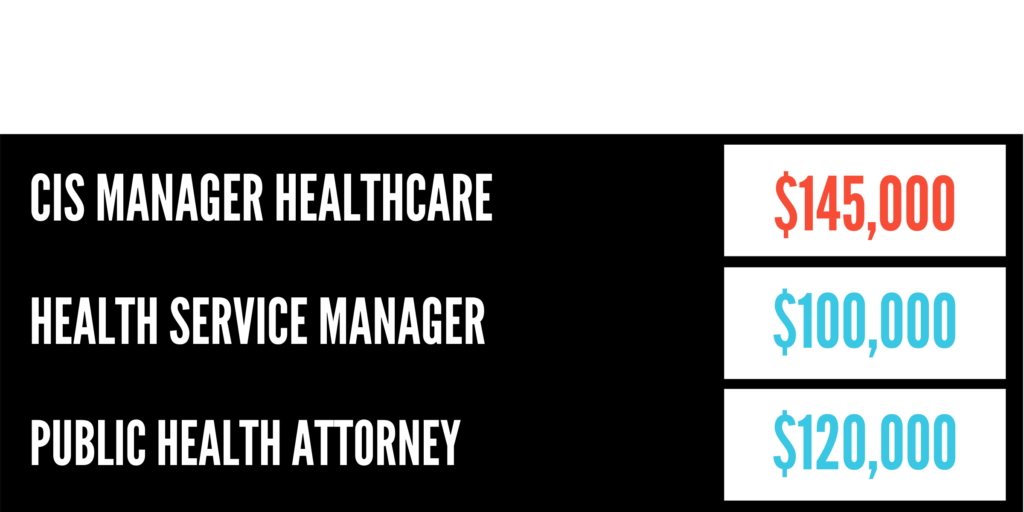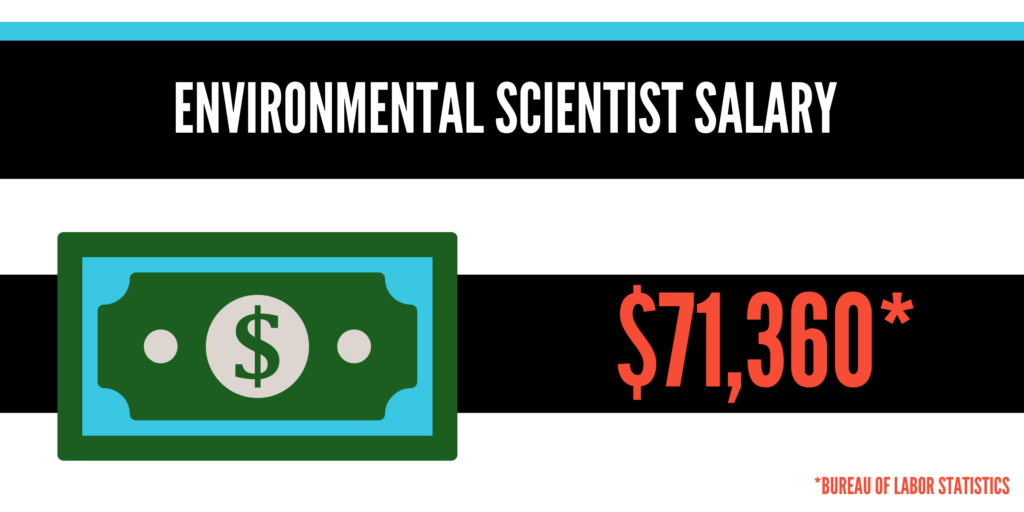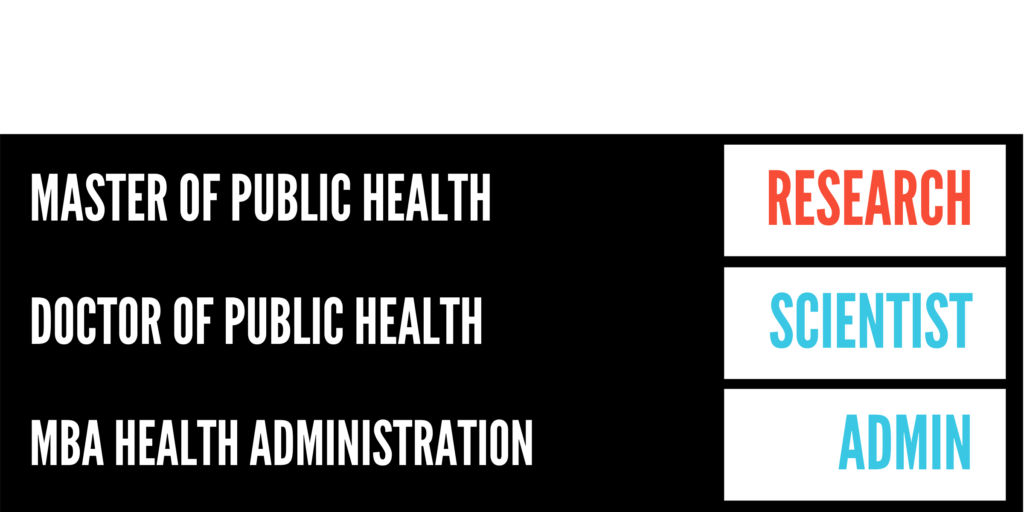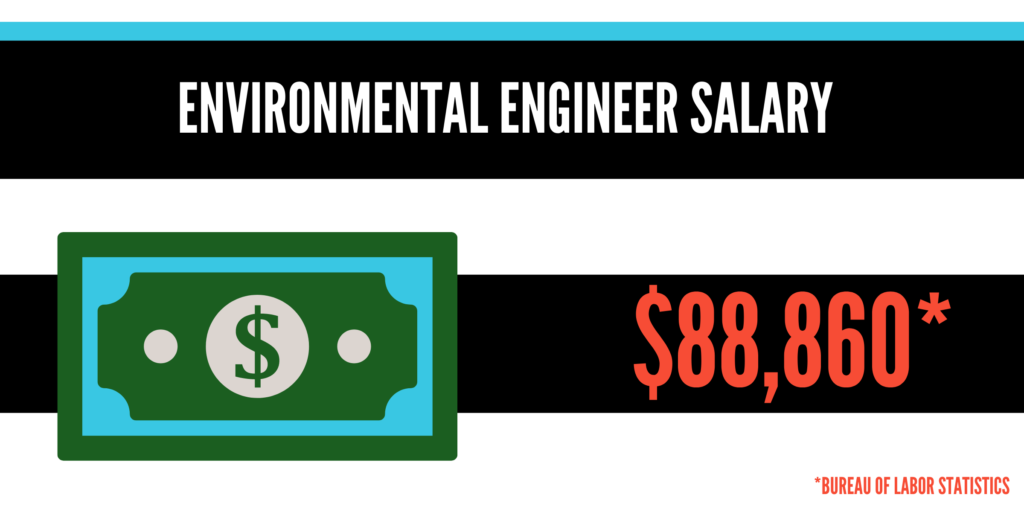Given the state of the world today where virtually every citizen now has personally experienced the severe health concerns surrounding the world pandemic, public health careers are seeing a renewed interest both in prospective professionals and the policy makers responsible for creating new public health positions and initiatives in the public sector.
A public health degree is a science-centric, interdisciplinary degree focused on thorough investigation of issues and topics related to public health–such as preventing and mitigating natural disasters, disease, and systemic health challenges. This flexibility in focus allows individual students the freedom to pursue specific studies within these topics, while also providing a generalized model of study which opens the door to many careers in public health.

As such the exact form and structure of a public health degree will depend on a number of factors: the level of the program, the direction implied by the program’s curriculum, and any degree specializations or program concentrations available.
A public health degree can provide an excellent alternative to degrees in medicine which are much more rigid in the constraints placed on curriculum and routes of study. Whereas medical students will learn how to intervene in individual cases of illness and injury, public health students learn how to create environments and implement programs to promote health in groups of people.
Before we dive into the various aspects of the public health degree and inroads to the job market, consider these resources if you have additional questions:
- WHAT IS PUBLIC HEALTH?
- WHAT IS THE DIFFERENCE BETWEEN A SOCIAL WORKER AND A PUBLIC HEALTH WORKER?
- HOW LONG DOES IT USUALLY TAKE TO GET A MASTER’S IN PUBLIC HEALTH?
- WHAT ARE THE BEST GRADUATE PROGRAMS IN PUBLIC HEALTH?
- WHAT BACHELOR’S DEGREE DO PEOPLE HAVE WHO WORK IN PUBLIC HEALTH?
- WHICH ARE THE BEST ONLINE PROGRAMS TO GET MY MASTER’S IN PUBLIC HEALTH?
- HOW MUCH HANDS-ON PRACTICAL WORK WILL I DO WHILE GETTING MY MASTER’S IN PUBLIC HEALTH?
- WHAT DEGREE DOES A PUBLIC HEALTH NURSE NEED?
- WHAT IS A BACHELOR’S DEGREE IN PUBLIC HEALTH?
- WHAT IS THE DIFFERENCE BETWEEN A MASTER OF PUBLIC HEALTH AND A MASTER OF SCIENCE IN PUBLIC HEALTH DEGREE?
- WHAT IS THE DIFFERENCE IN A BACHELOR OF ARTS AND BACHELOR OF SCIENCE IN PUBLIC HEALTH?
- WHAT JOBS ARE IN-DEMAND WITH A DEGREE IN PUBLIC HEALTH?
Roads to the Job Market with a Public Health Degree

Unlike medical degrees which typically require study in programs of at least a Bachelor’s level or Master’s level, students can enter the job market with a public health degree of any level, even an Associate’s degree. This provides a level of flexibility and adaptability for both prospective students and current public health professionals. That is, whether you are a working professional or prospective student, there will be a number of program options that will meet your needs.
Current public health professionals with a desire for professional advancement will have the option of going back to school–as programs exist at graduate and even doctorate levels. Similarly, these professionals will be able to work towards upward mobility in their careers by pursuing specific degree specializations within their chosen or desired area of focus.
While–in general–most public health degree programs start out with a more generalized curriculum at the undergraduate and associate level and become more specialized in higher level programs, the opposite can be true in select circumstances. In other words, students will most likely always have the option of choosing between specialized or generalized studies in public health.
Routes of Study in Public Health: Global, General, and Specialized

Given the sheer flexibility of public health degrees and the variety of programs on offer, what you can do with a public health degree will depend largely on the exact format of the degree earned. One of the most impactful distinctions to consider is the difference between generalized and specialized public health degree programs. While generalized programs will be guaranteed to cover the most important topics and issues relating to a career in public health, specialized programs will be best-suited for opening the door to specific career paths.
Another major dichotomy to recognize is that public health degree programs typically focus on either local/national public health, or global public health. Generalized curriculums may provide adequate explorations of both topics, but more specialized programs will usually fall into one category or another.
Here is a breakdown of popular professional specializations in public health:
- Biomedical Science
The field of biomedicine is an ideal career-destination for any professional who wants to work at the forefront of developing new medicines and treatments for disease and illness–often with a focus on global public health.
- Nutrition
Nutrition is the focus of professionals who want to intervene in public health concerns by targeting the nutritional and dietary behaviors of a group of people–usually with a focus on research and data gathering.
- Nutrition Technical Advisement
Nutrition technical advice is the professional focus of nutrition-minded professionals who wish to employ current nutrition research to act in an advisory capacity for organizations or even governmental bodies.
- International Health Care
International health care is the field of public health concerned with developing policies, procedures, and research targeted at the intersection of national and international health policy.
- Health Policy
Health policy is the sector of the public health profession that is primarily concerned with developing organizational or governmental policies to facilitate the meeting of certain metrics and standards of health.
- Private Health Consulting
Private health consulting is the sector of the public health profession that is primarily concerned with providing consulting services in the private sector–mainly to corporate organizations.
- Infectious Disease
Infectious disease is the area of public health that works at the forefront of preventing and intervening in cases of infectious disease. Professionals who specialized in this area typically either work in the field, or on the side of research and development.
- Public Health Practitionership
Public health practionership is the field of public health with perhaps the most flexibility, and is typically conferred by a Master’s of Public Health. Professionals with this kind of title work in a variety of fields and specializations.
- Biostatistics
Biostatistics is the field of public health that is focused on the statistical relevance of key factors and variables relating to public health. These professionals collect and analyze large data sets in order to glean valuable insights regarding public health.
- Environmental Health Science
Environmental health science is the field of public health that looks to the environment in considerations of public health–in other words these professionals work at the intersection of man and nature.
- Public Health Education
Public health education is the field of public health concerned with propagating important information through one of two routes–either in the context of the classroom, where educators look to cultivate the next generation of public health professionals; or in the context of providing education to communities and/or organizations in need of it.
- Health Care Management and Administration
Health care management and administration is the field of public health that is primarily concerned with the operations management of health care facilities or laboratories–such as hospitals and testing facilities.
- Water Quality Planning
Particularly in third world countries, the quality of public water services is at the center of public health concerns. Water quality planners work to ensure that communities are receiving adequate amounts of water and that the quality of water that they receive is up to par.
- Epidemiology
Epidemiology is the field of public health that is primarily concerned with the cataloguing of infectious diseases as well as the conditions that lead to or propagate such diseases. Epidemiologists often helm clinical trials to either develop treatment methods or to further develop our understanding of such diseases.
Public Health and the World Pandemic

Any prospective public health professional will want to know how the environment of the public health job market is shifting due to COVID-19–because the changes are extreme and far-reaching. Some of the most evident consequences of the worldwide pandemic are located in the sector of local public health opportunities.
As international health policies evolve there is an increasing demand for local public health professionals to implement these policies and to ensure public safety. As such, many opportunities are arising for public health professionals to work in smaller localized communities, whereas pre-covid the market was trending toward globalization and internationality.
Another major trend to consider is that epidemiology, testing, and biomedicine have seen explosive support and infusions of governmental infrastructure around the world. As all the world’s developed countries race to prevent future damages from Covid-19 and work to prevent the next world pandemic, many new opportunities have presented themselves in these areas.
Similarly, as large companies look to return to full or partial operation, there is an increased demand for public health professionals who will work in an advisory or consultancy capacity in this context to guide companies toward greater operational efficiencies while maintaining compliance with key public health policies and mandates.
It is important to mention though that like any job market, the environment and outcomes are always in flux and can be largely unpredictable in the long-term. In order to get a clear picture of how COVID-19 is impacting a specific area of the public health job market, be sure to speak to your professors, program directors, and active professionals in the field in order to get an accurate conception of realistic expectations to hold.
Catalogue of Public Health Jobs
When answering the question of ‘what can you do with a degree in public health?’ one of the most important elements in determining the answer is how the degree is earned. Given the flexibility and number of degree specializations on offer, students will be well-served in establishing a desired job early in their studies because most of the best public health jobs are gated behind certain academic or professional prerequisites that often require years of planning and effort to complete.
In order for students to know how to most effectively progress through their degree programs, let’s look at some of the most prominent professional end-goals and positions:
- Epidemiologist
Works to identity diseases, their causes, and effects. These professionals work at the forefront of preventing the spread of diseases or preventing them entirely.
- Biostatistician
Biostatisticians collect and summarize a wide range of biological data sets to inform a range of inquiries. In the context of public health, these professionals collect biological data that is decided to be of ‘high value’ in the context of public health.
- Industrial Hygienist
Industrial hygienists work to ensure that the working environments of large industrial operations remain compliant with public health standards and policies. Large manufacturing operations often employ hundreds of employees in strenuous physical conditions, and industrial hygienists work to ensure that these conditions do not become dangerous or unhealthy.
- Health Administrator
Health administrators work in a variety of professional contexts to ensure the effective operation of a health-minded organization.
- Health Economist
Health economy is a rapidly growing field that is positioned at the intersection of business and healthcare. Health economists gather data on how businesses use resources–both physical and organizational–to accomplish objectives in the healthcare industry.
- Health Educator
These professionals work at educators within the field of public of health, spreading valuable information in classrooms, corporate panels, and interorganizational conferences.
- Sanitarian
Public health sanitarians work to ensure that public spaces are properly cleaned so as to lessen the risk of infection, bacteria, and the spread of disease.
- Public Health Adviser
Public health advisers work as consultants and advisors to both governmental bodies and corporate organizations.
- Public Health Nurse
Public health nurses are specialized nursing professionals who work both at home and abroad to carry out public health directives and operations–particularly in the case of developing countries where public health outreach initiatives are more common.
- Program Director
Program directors work at the helm of various organizations and agencies–both in the public and private sectors. These professionals might oversee an individual testing clinic, healthcare facility, or even a number of them.
- Environmental Health Scientist
Environmental health scientists conduct studies, experiment, and collect data relevant to the intersection of nature and humanity. These scientists look to develop models for using the environment to facilitate better health of people–ideally in a symbiotic relationship. (Learn more about the 5 best careers in environmental science.)
- Toxicologist
Toxicologists are experts of the human body, and master the fundamentals of biochemistry to understand how certain molecules and compounds interact with the human body and its systems at the molecular level. These professionals can work in either the public or private sector.
- Health Analyst
Health analysts work in a variety of professional settings to explore high value inquiries related to health. Public health analysts work to analyze various factors, variables, and interactions in this context–with the specific inquiry depending on the analyst’s professional background.
- Demographer
Demographers are masters of statistics and epidemiology, who specialize in exploring the statistical significance of key metrics and variables relating to changing human populations and demographics.
- Medical Administrator
Given the size and scope of public health operations, medical administrators work to ensure the security and efficiency of these operations on the back-end. These administrators work to manage personnel, assign working schedules, and ensure necessary paperwork is up to date.
- Health Director
Health directors helm public health operations, acting as top-end managers and leaders of the organization.
- Health Commissioner
A health commissioner works at the forefront of a state or city’s public health operations, overseeing all organizational activities within a given territory. This is a career-end point and lifelong dream for many public health professionals.
- Minister of Health
A minister of health is a unique position which employs the resources of a faithful institution to facilitate the health of its congregation. These professionals work at many different levels depending on the structure of the faith-based institution and the scope of their position.
- Surgeon General
The Surgeon General is the leading head of federal public health services, and health concerns relating to government. The Surgeon General is the head of the U.S. Public Health Service Commissioned Corps and is the country’s figurehead on matters relating to public health.
10 Fastest Growing Jobs in Public Health

Investing in a public health degree is a serious life decision that requires a tremendous investment of time, effort, and money. So with this in mind, prospective students will be well-served to establish a good idea of which professions are best-suited to receive new new employees and recent graduates. So let’s look at some of the most demanded positions and sectors of the job market.
- Health Educator
Health educators work closely with clients and students to explore behaviors that promote health and wellbeing. Health educators can specialize in issues and concerns relating to public health.
Number of jobs in 2019: 127,100
Job Growth: 13% from 2019 to 2029
Median salary: $46,910
- Community Health Workers
Community health workers are the jacks of all trades in the public health industries. Their exact workload and professional responsibilities will depend almost entirely on their particular position and their employer’s needs. In the context of public health however, the primary task of community health workers is outreach.
Number of jobs in 2019: 56,130
Job Growth: 11% from 2019 to 2029
Median salary: $39,540
- Epidemiologist
These professionals explore the causes and factors related to the spread of disease. Oftentimes these professionals work for organizations in a research and data collecting capacity, and report their findings to their employer, the public, or both. Despite having seen some dropping off in its growth last year, COVID-19 has caused employers to show a renewed interest in hiring these professionals.
Number of jobs in 2019: 8,000
Job Growth: 5% from 2019 to 2029
Median salary: $70,990
- Biostatistician
Biostatisticians combine a mastery of statistics with expertise in biology in order to develop more comprehensive datasets to describe meaningful public health phenomena. While the BLS does not directly offer a profile for biostatisticians, the information below is for the larger category of ‘Mathematicians and Statisticians,’ which should convey an accurate picture of the job market.
Number of jobs in 2019: 45,700
Job Growth: 33% from 2019 to 2029
Median salary: $92,030
- Occupational Health and Safety Specialists
Occupational health and safety specialists are professional analysts who specialize in public health and safety within an organizational context. This position is growing in demand as companies around the world look to adapt to a world forever changed by COVID-19.
Number of jobs in 2019: 122,600
Job Growth: 4% from 2019 to 2029
Median salary: $70,480
- Clinical Research Coordinator
Clinical research coordinators are top-end managers who oversee clinical research trials and similarly formatted operations. These professionals combine an expertise in research and experimentation with business-management skills.
Number of jobs in 2019: N/A
Job Growth: 5% from 2019 to 2029
Median salary: $129,100
- Social and Community Service Managers
Social and community service managers organize, coordinate, and oversee programs and services designed to promote and facilitate public health. These professionals work in a variety of environments depending on their speciality and the specifics of the position.
Number of jobs in 2019: 175,500
Job Growth: 17% from 2019 to 2029
Median salary: $67,150
- Nonprofit Executive Director
Nonprofit executive directors are at the high end of business management in the public health sector. They oversee entire organizations, or even multiple organizations, in order to ensure their successful operation.
Number of jobs in 2019: 2,774,300
Job Growth: 4% from 2019 to 2029
Median salary: $104,690
- Healthcare Consultant
Healthcare consultants work in all areas of the public health industry, coordinating with their clients to help them reach key objectives in either personal or organizational health. Consultants can work either as self-employed professionals or as members of a larger corporate team.
Number of jobs in 2019: 422,300
Job Growth: 14% from 2019 to 2029
Median salary: $91,160
Making the Most out of your Public Health Degree

In order to have the most options for your public health degree, it is important to set yourself up to have those options to choose from–specifically there are some key strategies and elements to opening up the door to more and greater opportunities. Let’s catalogue those here:
- Begin establishing a specialization as early as possible–consider research projects and/or internships if your program does not offer them
- Consider an online degree program so that you can earn a public health degree while continuing to build professional experience in the job market
- If you don’t have time for a full degree program, consider a specialized graduate certificate in your desired specialization
- Ask your professors or employer what skills are needed most in the field you are interested in
- If you are having trouble finding your ideal job in the United States don’t be afraid to expand your search beyond its borders–after all, public health is global business
